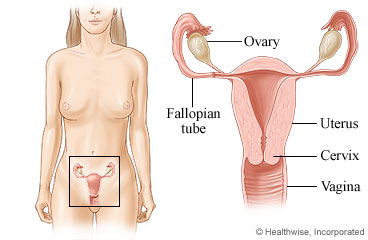Vaginal Bleeding (Nonpregnancy): Care Instructions
Overview

It's common to have bleeding or spotting between periods. Lots of things can cause it. You may bleed because
of hormone problems, stress, or ovulation. Fibroids and IUDs (intrauterine devices) can also cause bleeding.
If your bleeding or spotting is caused by one of these things and isn't heavy or doesn't happen often, you
probably don't need to worry.
But in rare cases, infection, cancer, or other serious conditions can cause bleeding. So you may need more
tests to find the cause of your bleeding.
The doctor has checked you carefully, but problems can develop later. If you notice any problems or new
symptoms, get medical treatment right away.
Follow-up care is a key part of your treatment and safety. Be sure to make and go to all
appointments, and call your doctor if you are having problems. It's also a good idea to know your test results
and keep a list of the medicines you take.
How can you care for yourself at home?
-
Take pain medicines exactly as directed.
-
If the doctor gave you a prescription medicine for pain, take it as prescribed.
-
If you are not taking a prescription pain medicine, ask your doctor if you can take an
over-the-counter medicine. Do not take aspirin, which may make bleeding worse.
-
If your doctor prescribed birth control pills for your bleeding, take them as directed.
-
Eat foods that are high in iron and vitamin C. Foods high in iron include red meat, shellfish, eggs,
beans, and leafy green vegetables. Foods high in vitamin C include citrus fruits, tomatoes, and broccoli.
Ask your doctor if you need to take iron pills or a multivitamin.
-
Ask your doctor when it is okay to have sex.
When should you call for help?
 Call 911
anytime you think you may need emergency care. For example, call if:
Call 911
anytime you think you may need emergency care. For example, call if:
Call your doctor now or seek immediate medical care if:
Watch closely for changes in your health, and be sure to contact your doctor if:
Current as of: November 27, 2023
Content Version: 14.0
Care instructions adapted under license by your
healthcare professional. If you have questions about a medical condition or this instruction, always ask
your healthcare professional. Healthwise, Incorporated disclaims any warranty or liability for your use of
this information.